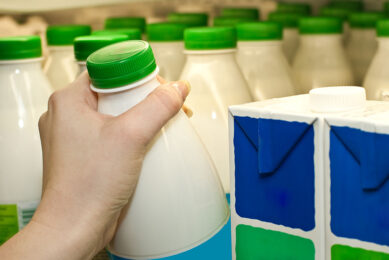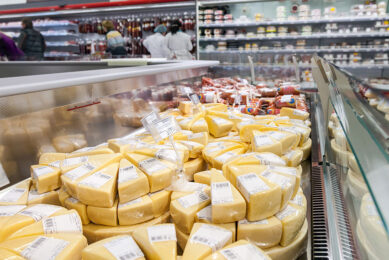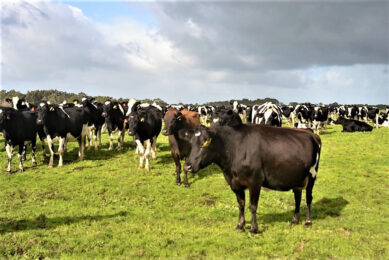Coronavirus: The global dairy industry reacts

It’s been hogging the headlines in recent months, Coronavirus (Covid-19) has claimed 3,831 lives, with a reported 110,381 cases to date. The impact of Covid-19 has been felt across a variety of industries. What have the reactions been in the dairy industry?
When looking at the dairy sector particularly, the coronavirus has bestowed an element of ‘unease’ around the global dairy market. We take a look at the situation in some countries and some reactions around the globe…

Australia
When it comes to export, China is Australia’s biggest export destination for dairy products and in 2019 a total of 245,000 tonnes of product was sent to the country.
According to a news report by Dairy Australia senior analyst Sofia Omstedt said the evidence of the impacts from the Coronavirus, is largely anecdotal at this stage because there is little data available. “The ultimate impact depends heavily on how long it takes to get the virus under control.” She believes there will be an impact on the food service sector because of the number of people no longer eating out.
New Zealand
With the ongoing spread of the Coronovirus and 16 million people in the Lombardy region, Northen Italy, on lockdown, the impact of the coronavirus outbreak continues to spread, and causing the New Zealand dairy industry to worry.
A report by the NZherald states that Richard Wyeth CEO of Miraka Dairy, a Taupō-based dairy processing business with more than 130 staff is keeping a close watch on Covid-19, like many in the dairy industry.
“I’ve spoken to a few [dairy industry CEOs] in the agri-sector who are nervous about what’s happening,” Wyeth said. “Certainly where they’ve got large exposure to China and where they’ve got fresh products. I think they’re the ones that are probably more nervous than the likes of myself who have got a bit more time.
“With coronavirus, what the [Chinese] government did to reduce impact was actually told people to stay home for an extra week,” Wyeth said. “So it’s really impacting the hotels, restaurants and cafe trade over there,” he added.
“If this had happened during the peak milk period in October, it would have been really significant. But because we’re in the lower period of the year with milk flows, it’s not having as severe of an impact as it could have.”
According to another report, the country’s exports may already have been impacted by around NZ$300 mln already. New Zealand’s Prime Minister Jacinda Ardern touched on what the economic response to the threat of COVID-19 might be, and in light of the current situation, experts stated that it’s only a matter of time when the industry will be impacted as New Zealand is significantly dependent on the global economy. The Government is set to reveal a package of measures which will help ease the economic blow. “The Minister of Finance is meeting with the banks because they are at the frontline of helping support businesses affected by COVID-19. We want to make sure they’ve got their hardship packages in place, and what we’re doing is complementary to that,” Ardern added. She further said that “We also want to make sure we are prepared for wider spread in the economy,“ and that the dairy industry is doing ok.
USA
The story may be a little different in the US where in Wisconsin dairy farmers and other producers are feeling the impact of trade uncertainty due to COVID-19. According to a report by Wisconsin State Farmer, Mark Stephenson, director of dairy policy analysis at the University of Wisconsin-Madison, said milk futures prices dropped dramatically in early February as the number of coronavirus cases continued to grow.
Stephenson stated that market reaction comes from concerns about how widespread the outbreak will become and its impact on dairy exports. “It’s a pretty big concern when you’ve got the world’s largest importer of dairy products with obviously such a problem as the coronavirus appears to be,” Stephenson said.
“You may find that it’s just hard to get products into the country and to move them through a country. We do see a number of other stores, higher profile stores that are closing down and just not open for business,” Stephenson said.
Secretary Tom Vilsack, CEO of the US Dairy Export Council and former US Secretary of Agriculture noted 2 main reasons prices are suffering: A backlog at Chinese ports and reduced demand. Vilsack further said: “We’re working our way through that process and so we’re probably going to see a continuation for several weeks or months of continued congestion at those Chinese ports, at least at the coastal ports.”
“I still think on a global basis coronavirus knocks something like 6%, maybe 7% off the dairy prices over the next 12 months,” says Nate Donnay, director of dairy intelligence at INTL FCStone.
Romania
Meanwhile in Romania in February the consequences of public hysteria was very much visible in supermarkets. The Romanian public has had major concerns over a possible national outbreak hitting the country.
Shoppers across the country took to supermarkets in panic, wanting to stock up on groceries. Major concerns and fears in Romania that the impact of the virus would leave food supplies short has resulted in many buying weeks’ worth of groceries in one go. Packed to the brim shopping carts and empty meat and dairy shelves could be seen in Romania, due to the growing sense of panic gripping the country.
“There is no need to change our way of life, no need to crowd supermarkets, empty shelves and panic our relatives at home or abroad. When someone is quarantined, that person is cared for by authorities,” said the ministry state secretary, Nelu Tataru, at a press conference.
China
China is currently crippled by COVID-19. The country is still grappling with the virus and today, China reported 44 new cases of Covid-19, and according to the BBC, it is the lowest since January when reporting began. In total thus far, the country with the majority of cases with 81%, it reported 80,739 affected with a death toll of 3,120.
The country’s exports and imports have certainly been impacted. Due to some shipping containers unable to dock at Chinese ports, it could result in some perishable products like butter and cheese being spoiled. China, the largest importer of dairy products could see a major blow to its economy and dairy sector. But how much will markets be interrupted? In Wisconsin, US for example, whey products, a byproduct of cheese making, are sold from Wisconsin to China. A Wisconsin farmer is worried that the coronavirus could create a major hurdle in terms of exports of whey. With the disruption across industries in China, the country’s economy will be highly impacted. In short, disruption in economy may affect China’s ability to buy dairy products and in turn affect the US economy.
Italy
Italy is fighting to bring the virus under control. The BBC has said: Up to 16 million people in Lombardy and 14 provinces need special permission to travel under new quarantine rules. Industry experts in the food sector are warning of the impact it may have. Northern Italy has been hit hard by the outbreak, with many towns in lockdown. Ivano Vacondio, the president of Federalimentare has warned that the food sector is particularly exposed. He said, “The risk of a production blockade of the northern regions…could impose a brake on the Italian manufacturing sector, including the food sector.” In 2019, Lombardy produced 44% of Italian milk, according to CLAL.it.
Italy has the highest number of confirmed infections outside China, where the outbreak originated in December 2019.
Statistics thus far
According to recent statistics, the coronavirus COVID-19 affects 109 countries and territories around the world and 1 international conveyance (the Diamond Princess cruise ship harbored in Yokohama, Japan)
For more statistics on the coronavirus and countries affected, visit worldometers.










